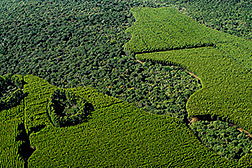- Number 416 |
- June 23, 2014
Eucalyptus expands candidate biomass feedstock genomic library

Eucalyptus–A Global Tree for Fuel and Fiber.
For the Department of Energy, eucalyptus trees rank among the principal candidate biomass energy crops because of their extremely fast growth rate, energy-rich cellulosic biomass, and their ability to grow in 100 countries across six continents. Genome sequencing is an essential diagnostic tool for understanding the basis of its superior growth properties, attributes that can be propagated to other candidate biofuel feedstock species. As reported in the June 19, 2014 issue of the journal Nature, the international effort to sequence and analyze the 640-million base pair genome of Eucalyptus grandis involved more than 80 researchers from 30 institutions, representing 18 countries. The project was led by Alexander Myburg of the University of Pretoria (South Africa); Dario Grattapaglia of the Brazilian Agricultural Research Corporation (EMBRAPA) and Catholic University of Brasilia; Gerald Tuskan of the Oak Ridge National Laboratory and the BioEnergy Science Center and U.S. Department of Energy Joint Genome Institute (DOE JGI); Dan Rokhsar of the DOE JGI and Jeremy Schmutz of the DOE JGI and the HudsonAlpha Institute for Biotechnology.
Combing through the 36,000-plus genes found in Eucalyptus, the researchers homed in on those that may influence the production of secondary cell wall material that can be processed for pulp, paper, biomaterials and bioenergy applications. One of the team’s findings is that among sequenced plants to date, Eucalyptus showed the highest diversity of genes for specialized metabolites such as terpenes. These hydrocarbons serve as chemical self-defenses against pests, as well as providing the familiar aromatic essential oils used in both medicinal cough drops and for industrial processes.
“By having a library of these genes that control the synthesis of terpenes we are able to dissect which genes produce specific terpenes; then we can modify this biochemical pathway in the leaves so that we can develop the potential of Eucalyptus as an alternative source feedstock for jet fuel,” noted Tuskan.
Read more at http://jgi.doe.gov/just-food-koalas-eucalyptus-global-tree-fuel-fiber/[Massie Ballon, 925.927.2541,
mlballon@lbl.gov]
